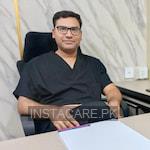Disc Degeneration - Symptoms, Risk factors and Treatment
Last Updated On Saturday, February 28, 2026
Disc Degeneration in Urdu
ڈسک کا انحطاط ایک ایسی حالت ہے جس میں ریڑھ کی ہڈی کی ڈسک میں تبدیلی درد کا باعث بنتی ہے۔ آپ کی ریڑھ کی ہڈی میں چھوٹی چھوٹی ڈسکیں ہوتی ہیں جو جھٹکا جذب کرنے والی ہوتی ہیں، جو آپ کی ریڑھ کی ہڈی یا ریڑھ کی ہڈی کے درمیان ہوتی ہیں۔ وہ آپ کی کمر کو لچکدار رکھنے میں اپنا کردار ادا کرتے ہیں تاکہ آپ جھک سکیں، گھٹنے ٹیک سکیں اور موڑ سکیں۔ ان ڈسکس میں تبدیلیاں درد، کمزوری، یا بے حسی کا سبب بن سکتی ہیں جو بازوؤں یا ٹانگوں تک پھیلتی ہیں۔ یہ کوئی بیماری نہیں ہے، اس کے بجائے، یہ آپ کی عمر کے ساتھ ساتھ ہونا معمول کی بات ہے۔ عام طور پر، ہر ڈسکس وقت کے ساتھ ٹوٹ جاتی ہے۔ لیکن جب یہ درد کا سبب بنتا ہے، تو یہ ظاہر کرتا ہے کہ ڈسک میں انحطاطی تبدیلیاں واقع ہوئی ہیں۔
Disc Degeneration in English
Disc degeneration is a condition in which changes in the spine disc causes pain. Your spinal cord has little discs that are shock absorbers, placed in between your vertebrae or bones of your spine. They play a role in keeping your back flexible so that you can bend, kneel and twist. Changes in those discs can cause pain, weakness, or numbness that radiates to the arms or legs. It is not a disease, instead, it is normal to occur as you age. Generally, everyone discs break down over time. But when it causes pain, it indicates degenerative disc changes have occurred.
Causes
The spinal discs have a soft inner core known as the nucleus pulposus, and a hard outer core is known as annulus fibrous that consists of several layers, overlapping each other. Some reasons can cause degenerative disc changes like;
Loss of fluid
In a normal adult, the intervertebral disc consists of 90% fluid. As you age, the fluid may become less, causing thinning of discs. Therefore, the distance between the two vertebrae becomes less. Therefore, it becomes less effective as a cushion.
Disc structure
Over years everyday day stresses or minor injuries can cause tiny tears in the outer wall of the disc that contains nerves. Those tears can cause pain in your vertebrae. If the outer wall of the vertebrae breaks down, the inner soft portion may protrude outwards through the cracks. Also, the disks can slip out of the place or bulge out, called a herniated disc or slipped disc. It can also affect the surrounding nerves, exerting pressure over them and causing pain and numbness.
Symptoms
The most common symptom of disc degeneration is a pain in the back or neck. The exact symptoms of disc slip or herniation may vary according to the part of vertebrae where it happens. Common symptoms of disc degeneration can be;
- Pain that occurs in your lower back, upper thigh, or buttocks
- Pain that comes and goes could be severe or nagging, lasting from a few days to months.
- Pain that becomes worse upon sitting for a long time and gets better when you walk or stand straight.
- Pain that gets better when you lie down or change position
In some cases, the bulged disc can exert pressure on your nerves, which causes tingling and numbness in the arms or legs, causing the muscles to become weak. Numbness can be an indication that damaged discs are affecting the nerves present near your spine.
Treatment
The healthcare providers aim to lower pain and inflammation of the vertebrae and to stop the damage. They may prescribe the following medications;
Over-the-counter anti-inflammatory drugs to lower pain and inflammation like ibuprofen and aspirin.
Physical therapy- that helps relieve pain and makes your back and neck strong and flexible. Also, it helps to support the spine.
To relieve inflammation, the healthcare providers may administer steroid injections that help get rid of pain, inflammation, and swelling. Steroid injections are injected epidurally directly into your back.
Surgery- the healthcare provider may perform a procedure called discectomy, in which they remove the herniated disc.
Conclusion
Disc degeneration is a condition in which changes in the spine disc causes pain. Your spinal cord has little discs that are shock absorbers, placed in between your vertebrae or bones of your spine. They play a role in keeping your back flexible so that you can bend, kneel and twist. Changes in those discs can cause pain, weakness, or numbness that radiates to the arms or legs.






